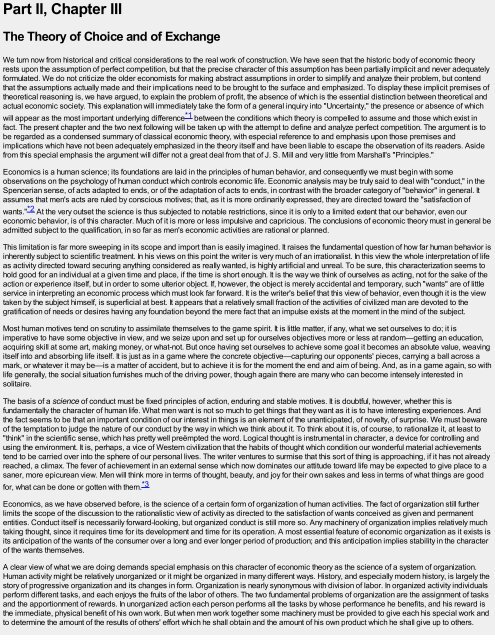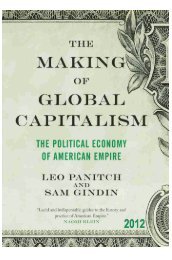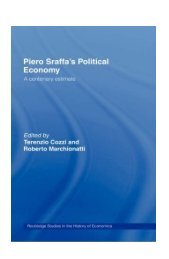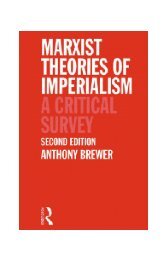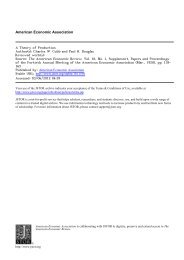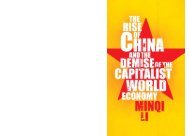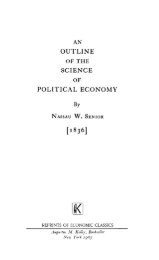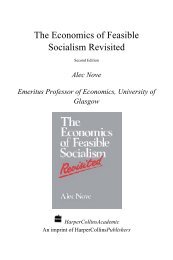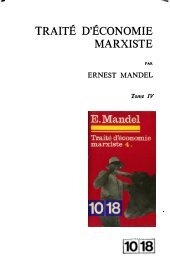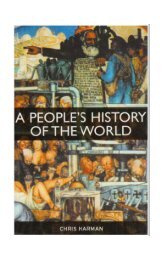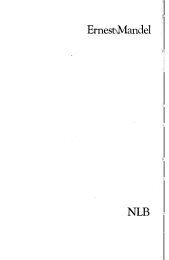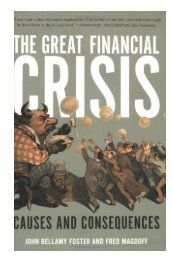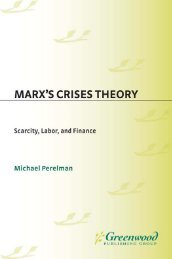Part II, Chapter IIIThe Theory of Choice <strong>and</strong> of ExchangeWe turn now from historical <strong>and</strong> critical considerations to the real work of construction. We have seen that the historic body of economic theoryrests upon the assumption of perfect competition, but that the precise character of this assumption has been partially implicit <strong>and</strong> never adequatelyformulated. We do not criticize the older economists for making abstract assumptions in order to simplify <strong>and</strong> analyze their problem, but contendthat the assumptions actually made <strong>and</strong> their implications need to be brought to the surface <strong>and</strong> emphasized. To display these implicit premises oftheoretical reasoning is, we have argued, to explain the problem of profit, the absence of which is the essential distinction between theoretical <strong>and</strong>actual economic society. This explanation will immediately take the form of a general inquiry into "<strong>Uncertainty</strong>," the presence or absence of whichwill appear as the most important underlying difference *1 between the conditions which theory is compelled to assume <strong>and</strong> those which exist infact. The present chapter <strong>and</strong> the two next following will be taken up with the attempt to define <strong>and</strong> analyze perfect competition. The argument is tobe regarded as a condensed summary of classical economic theory, with especial reference to <strong>and</strong> emphasis upon those premises <strong>and</strong>implications which have not been adequately emphasized in the theory itself <strong>and</strong> have been liable to escape the observation of its readers. Asidefrom this special emphasis the argument will differ not a great deal from that of J. S. Mill <strong>and</strong> very little from Marshall's "Principles."Economics is a human science; its foundations are laid in the principles of human behavior, <strong>and</strong> consequently we must begin with someobservations on the psychology of human conduct which controls economic life. Economic analysis may be truly said to deal with "conduct," in theSpencerian sense, of acts adapted to ends, or of the adaptation of acts to ends, in contrast with the broader category of "behavior" in general. Itassumes that men's acts are ruled by conscious motives; that, as it is more ordinarily expressed, they are directed toward the "satisfaction ofwants." *2 At the very outset the science is thus subjected to notable restrictions, since it is only to a limited extent that our behavior, even oureconomic behavior, is of this character. Much of it is more or less impulsive <strong>and</strong> capricious. The conclusions of economic theory must in general beadmitted subject to the qualification, in so far as men's economic activities are rational or planned.This limitation is far more sweeping in its scope <strong>and</strong> import than is easily imagined. It raises the fundamental question of how far human behavior isinherently subject to scientific treatment. In his views on this point the writer is very much of an irrationalist. In this view the whole interpretation of lifeas activity directed toward securing anything considered as really wanted, is highly artificial <strong>and</strong> unreal. To be sure, this characterization seems tohold good for an individual at a given time <strong>and</strong> place, if the time is short enough. It is the way we think of ourselves as acting, not for the sake of theaction or experience itself, but in order to some ulterior object. If, however, the object is merely accidental <strong>and</strong> temporary, such "wants" are of littleservice in interpreting an economic process which must look far forward. It is the writer's belief that this view of behavior, even though it is the viewtaken by the subject himself, is superficial at best. It appears that a relatively small fraction of the activities of civilized man are devoted to thegratification of needs or desires having any foundation beyond the mere fact that an impulse exists at the moment in the mind of the subject.Most human motives tend on scrutiny to assimilate themselves to the game spirit. It is little matter, if any, what we set ourselves to do; it isimperative to have some objective in view, <strong>and</strong> we seize upon <strong>and</strong> set up for ourselves objectives more or less at r<strong>and</strong>om—getting an education,acquiring skill at some art, making money, or what-not. But once having set ourselves to achieve some goal it becomes an absolute value, weavingitself into <strong>and</strong> absorbing life itself. It is just as in a game where the concrete objective—capturing our opponents' pieces, carrying a ball across amark, or whatever it may be—is a matter of accident, but to achieve it is for the moment the end <strong>and</strong> aim of being. And, as in a game again, so withlife generally, the social situation furnishes much of the driving power, though again there are many who can become intensely interested insolitaire.The basis of a science of conduct must be fixed principles of action, enduring <strong>and</strong> stable motives. It is doubtful, however, whether this isfundamentally the character of human life. What men want is not so much to get things that they want as it is to have interesting experiences. Andthe fact seems to be that an important condition of our interest in things is an element of the unanticipated, of novelty, of surprise. We must bewareof the temptation to judge the nature of our conduct by the way in which we think about it. To think about it is, of course, to rationalize it, at least to"think" in the scientific sense, which has pretty well preëmpted the word. Logical thought is instrumental in character, a device for controlling <strong>and</strong>using the environment. It is, perhaps, a vice of Western civilization that the habits of thought which condition our wonderful material achievementstend to be carried over into the sphere of our personal lives. The writer ventures to surmise that this sort of thing is approaching, if it has not alreadyreached, a climax. The fever of achievement in an external sense which now dominates our attitude toward life may be expected to give place to asaner, more epicurean view. Men will think more in terms of thought, beauty, <strong>and</strong> joy for their own sakes <strong>and</strong> less in terms of what things are goodfor, what can be done or gotten with them. *3Economics, as we have observed before, is the science of a certain form of organization of human activities. The fact of organization still furtherlimits the scope of the discussion to the rationalistic view of activity as directed to the satisfaction of wants conceived as given <strong>and</strong> permanententities. Conduct itself is necessarily forward-looking, but organized conduct is still more so. Any machinery of organization implies relatively muchtaking thought, since it requires time for its development <strong>and</strong> time for its operation. A most essential feature of economic organization as it exists isits anticipation of the wants of the consumer over a long <strong>and</strong> ever longer period of production; <strong>and</strong> this anticipation implies stability in the characterof the wants themselves.A clear view of what we are doing dem<strong>and</strong>s special emphasis on this character of economic theory as the science of a system of organization.Human activity might be relatively unorganized or it might be organized in many different ways. History, <strong>and</strong> especially modern history, is largely thestory of progressive organization <strong>and</strong> its changes in form. Organization is nearly synonymous with division of labor. In organized activity individualsperform different tasks, <strong>and</strong> each enjoys the fruits of the labor of others. The two fundamental problems of organization are the assignment of tasks<strong>and</strong> the apportionment of rewards. In unorganized action each person performs all the tasks by whose performance he benefits, <strong>and</strong> his reward isthe immediate, physical benefit of his own work. But when men work together some machinery must be provided to give each his special work <strong>and</strong>to determine the amount of the results of others' effort which he shall obtain <strong>and</strong> the amount of his own product which he shall give up to others.
Modern industrial society, the "existing economic order," performs this twofold task chiefly through free agreement <strong>and</strong> voluntary exchange betweenindividuals themselves. Economic theory is the analysis of this mechanism, viewed for the scientific purpose of simplification as the only form ofhuman relation. Going back to mediæval times or to the American frontier, we find relatively little joint activity, except for the division of laborbetween the sexes <strong>and</strong> in the family. Such organization as existed for war, religion, etc., was not along free exchange lines. But there was alwayssome commerce with different regions, <strong>and</strong> this has always been worked out largely through exchange. As time passes we find that the greatestchange is in the development of organization, <strong>and</strong> especially of the voluntary, free exchange type, though, to be sure, the functions of the politicalstate develop also. We can imagine that industrial progress might have taken a very different form. The problems of the apportionment, of tasks<strong>and</strong> rewards might be solved for a complicated, technical civilization by an autocratic, theocratic, or militaristic giving of orders <strong>and</strong> rationing ofproduce in which the individual would have no voice in the least detail either of his work or his enjoyment. *4 Or, again, we might have any one ofnumerous forms of democratic socialism. Some (the anarchists) have imagined that organization might be carried out without either exchangerelations or a centralization of authority, simply by general consent. But it has been <strong>and</strong> is done principally through competitive free agreement, <strong>and</strong>our task is to study this mechanism <strong>and</strong> not any other.The first essential of the existing system is that it solves its two fundamental problems together, as one. It is individualistic; it apportions tasksthrough the apportionment of rewards; it is an automatic system, in which the interrelations of individuals are determined by self-seeking on the partof each. The foundation of the process is the private ownership of productive resources—a synonym for individual freedom. There is (as we shallsee more at length as we proceed) no difference in principle between the ownership of one's own powers <strong>and</strong> the ownership of other productiveresources. The essence of ownership is the association or union of these two facts: (1) control of the agency, <strong>and</strong> (2) the right of disposition over itsproduct. Modern society (on the economic side) is organized on the theory that the owners of productive resources will find their best use <strong>and</strong> placethem in it, because in that way they can procure the largest returns for themselves. This system, therefore, involves the assumption that even in acomplex organization the separate contribution of each separate productive agency can be identified, <strong>and</strong> that free competitive relations tend toimpute to each agency its specific contribution as its reward for participation in productive activity. And to the extent that the system works at all,that we have an economic order <strong>and</strong> not chaos, this assumption must be justified.From another point of view we may envisage the task of organization in three steps or stages:1. Society as an organized entity must decide the relative importance of different lines of consumption as a basis for the guidance of production.Closely connected with this task, <strong>and</strong> worked out together with it, is the apportionment of existing stocks of goods, the product of past industry, inthe satisfaction of existing wants. This twofold problem is worked out in the consumption goods market from day to day. The study of the processconstitutes the first main division of economic science, the theory of market price.2. Society must actually organize production. Every available productive agency is, so far as the system is successful, to be assigned to that task,<strong>and</strong> grouped with others in that way which will enable it to make the greatest possible contribution to the social dividend (of goods equatedquantitatively according to the value scale established in the consumption goods market). The machinery for the direction of productive resourcesto their different uses is organized in the market for productive resources. The study of its workings is the second fundamental division of thescience. It falls into two subdivisions, short-time distribution theory <strong>and</strong> long-time value theory. *5 For the purpose of this study the supplies ofproductive resources must be taken as fixed, as well as the dem<strong>and</strong> which they are to satisfy. Both the prices of consumption goods <strong>and</strong> thedistributive shares are in fact much affected by the third general problem cutting across both the others.3. At the same time that society is employing existing resources to satisfy existing wants it is also setting aside a portion of its existing resources toincrease the supplies of those resources themselves, to improve the effectiveness of their use by working out better methods of production, <strong>and</strong> toincrease its own membership in numbers <strong>and</strong> quality by providing for an excess of births over deaths <strong>and</strong> through education <strong>and</strong> refinement. Thereis thus another aspect to the problems of relative importances <strong>and</strong> of organization. Decision must be made as to how much of society's income isto be diverted from present consumption <strong>and</strong> to be used for the purpose of furthering social progress, <strong>and</strong> the diverted income must be applied tothis purpose as effectively as may be. The first part of the problem is solved in the market by competition between present goods <strong>and</strong> theprospective fruits of their investment, giving rise to a rate of capitalization or of interest; <strong>and</strong> the second part is solved by competition for savingsbetween different opportunities for their use. *6The fact that theoretical reasoning must take a large, long-run view of life leads to a difficulty in the treatment of wants which has been the source ofmuch confusion. Our wants have the character of intermittence <strong>and</strong> recurrence; in any short period of time they are satisfied with a relatively smallamount of what the want calls for, <strong>and</strong> we turn to the satisfaction of some other want. But if it is a true fundamental want it comes back again, <strong>and</strong>from a long-run point of view they all, with their satisfactions, take on the character of continuity. The periodicity, alternation between desire <strong>and</strong>satisfaction in the case of any one <strong>and</strong> dominance of different wants in succession, drops out if we look ahead a considerable distance so as toinclude a number of "complete cycles," so to speak. This long-run point of view is the one necessarily taken by a planned program of satisfyingwants; it is evident that our activities at a moment are not predominantly affected by the thing we happen to be "hungry" for at that moment. Whenwe go into a store to make our purchases we do not consult the momentary state of appetite or satiety in respect of any particular need, but its longrunimportance in our existence viewed as a continuous process.The problem of want-satisfaction is, therefore, a problem in proportions, or relative rates. The question is not how much absolutely of this or that,but how much—i.e., how large a share—of our time or income is to be devoted to each need or line of activity, how much per year or some otherperiod long enough to get rid of the fluctuations. We can get the point of view by imagining that we had to plan our lives for a year on the first ofJanuary <strong>and</strong> live out the plan in detail. Economic discussion in terms of "quantities" of effort or satisfaction or choice between alternatives, underthe influence of motives as immediate desires, is therefore elliptical, <strong>and</strong> more or less dangerous. The quantities of economics are properly rates,the motives not desires immediately present to consciousness, but detached judgments of need or value.A fundamental fact about wants is their habit of conflicting among themselves. In fact, conflict seems to be essential to the very nature of consciousdesire. It is questionable whether wants, as conscious motives to conduct, ever exist unless we are in a position of having to choose, to adopt oneline of conduct <strong>and</strong> renounce another. Wants must be distinguished from needs which do not enter into our planful ordering of life. We "need"iodides <strong>and</strong> vitamines, <strong>and</strong> an infinite number of things of whose existence the race at large has been blissfully ignorant; but we do not "want" them,
- Page 2 and 3: Go To Chapter 1Author's PrefaceTher
- Page 4 and 5: possible. It is the scientific meth
- Page 6 and 7: drawn-out redistribution of energy
- Page 8 and 9: left after (a) interest, (b) insura
- Page 10 and 11: The fatal criticism of this procedu
- Page 12 and 13: sides of the controversy, in assumi
- Page 16 and 17: ecause they give rise to no conflic
- Page 18 and 19: credits are equal. There is a sort
- Page 20 and 21: either superabundant, and consequen
- Page 23 and 24: Part II, Chapter IVJoint Production
- Page 25 and 26: on his business. It is obvious that
- Page 27: word "product" in the same meaning
- Page 30 and 31: that the owner of such property may
- Page 32 and 33: consumption, to secure a rising dis
- Page 34 and 35: difference between personal ability
- Page 36 and 37: limits its increase rises at the sa
- Page 38 and 39: amounts of agencies not freely repr
- Page 40 and 41: Part II, Chapter VIMinor Prerequisi
- Page 42 and 43: Clark School. "Monopoly" is a word
- Page 44 and 45: incapable of wielding to his own ad
- Page 46 and 47: automata, but we are not. At least
- Page 48 and 49: The practical limitation of knowled
- Page 50 and 51: to its conclusion, it seems that th
- Page 52 and 53: should regard the probability for h
- Page 54 and 55: themselves into an opinion of a pro
- Page 56 and 57: equally probable alternatives; but
- Page 58 and 59: It is particularly noteworthy that
- Page 60 and 61: Part III, Chapter IXEnterprise and
- Page 62 and 63: ecommenced at the beginning.We turn
- Page 64 and 65:
number of times. The allowance for
- Page 66 and 67:
Part III, Chapter XEnterprise and P
- Page 68 and 69:
esources are placed in an exposed p
- Page 70 and 71:
Pure profit is theoretically unimpu
- Page 72 and 73:
This distinction is also well recog
- Page 74 and 75:
call for the exercise of judgment i
- Page 76 and 77:
The uncertainty so far discussed in
- Page 78 and 79:
others. It will ordinarily be true
- Page 80 and 81:
e a brief examination into the mean
- Page 82 and 83:
And this even though the same men k
- Page 84 and 85:
economic conduct, and weighed again
- Page 93 and 94:
Frank H. Knight, Risk, Uncertainty,
- Page 95 and 96:
18. These national designations of
- Page 97 and 98:
dynamic economic changes are of thi
- Page 99 and 100:
2. This is intended as a statement
- Page 101 and 102:
of æsthetics (another form of "val
- Page 103 and 104:
Economics, vol. XVI, pp. 473 ff.) B
- Page 105 and 106:
57. See chapter VI.58. We may notic
- Page 107 and 108:
Economy, pp. 72 ff., where the same
- Page 109 and 110:
War, in particular, has wrought cha
- Page 111 and 112:
105. There is one important excepti
- Page 113 and 114:
time tendencies or with "static" ec
- Page 115 and 116:
24. Chapter V, the reader will reca
- Page 117 and 118:
virtue" of opiates. The latter at l
- Page 119:
68. Principles of Economics (1913),


